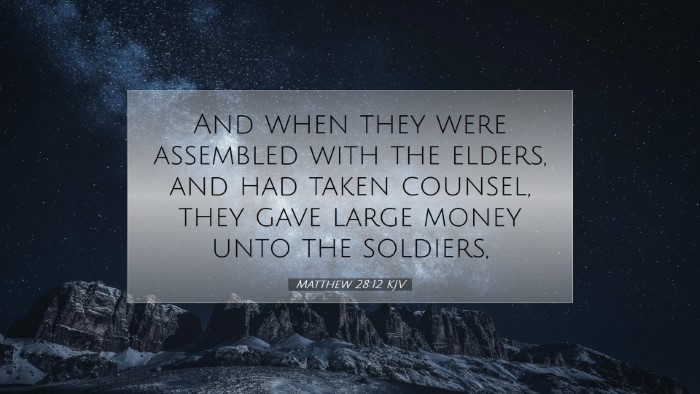Commentary on Matthew 28:12
Introduction:
This crucial verse occurs in the context of the resurrection of Jesus Christ, a cornerstone of Christian doctrine. Matthew 28:12 describes the actions taken by the chief priests and elders following the discovery of the empty tomb. This commentary combines insights from Matthew Henry, Albert Barnes, and Adam Clarke to provide a deeper understanding of the implications surrounding this event.
Verse Text
"And when they were assembled with the elders, and had taken counsel, they gave large money unto the soldiers." (Matthew 28:12, KJV)
Contextual Analysis
Matthew 28 concludes the Gospel of Matthew with the narrative of Jesus’ resurrection. This culminates a series of events leading up to His death, burial, and subsequent resurrection. The response of the religious leaders to the resurrection is pivotal for understanding the implications of the event.
Background of the Chief Priests
- Religious Authority: The chief priests represented the highest authority in the Jewish religious structure. Their actions following the resurrection reflect their fear of losing power.
- Political Motivations: The Jewish leaders were deeply concerned about maintaining their influence over the people, especially in light of Jesus’ rising popularity.
- Conspiracy Against the Truth: Their decision to bribe the soldiers illustrates how far they would go to suppress the truth of Jesus’ resurrection.
Insights from Commentators
Matthew Henry's Commentary
Matthew Henry emphasizes the lengths to which the religious leaders would go to protect their interests. He notes that the empty tomb was undeniable evidence of the resurrection, yet their response was not one of repentance or belief but of deceit.
- The Bribery: Henry indicates that offering large sums of money to the soldiers was an act of desperation. It highlights their willingness to fabricate a story to maintain the status quo.
- Moral Implications: The moral depravity displayed by the chief priests serves as a lesson for believers about the dangers of prioritizing earthly authority over divine truth.
Albert Barnes' Notes
Albert Barnes offers a critical examination of the historical and political implications of this event. He asserts that the actions of the leaders reveal their acknowledgment of the resurrection’s reality, contrasting with their attempts to deny it.
- Recognition of Authority: Barnes states that the leaders' concocted story of the disciples stealing the body signifies their understanding of the resurrection's significance and their fear of it.
- Historical Impact: He points out that this narrative highlights the lengths to which authorities will go to uphold their power, foreshadowing future persecutions against the followers of Christ.
Adam Clarke’s Commentary
Adam Clarke provides a scholarly analysis, emphasizing the reactions of those in power. He reflects on the moral and ethical dimensions of the leaders' decisions.
- Deceitful Counsel: Clarke notes the irony of the chief priests resorting to deception, which they often condemned in others, illustrating a complex dynamic of power and hypocrisy.
- Spiritual Application: He encourages modern readers to reflect on where their own allegiances lie—whether in the pursuit of truth or in conformity to societal pressures.
Theological Implications
The response of the chief priests to the resurrection of Jesus has profound theological implications.
- Resurrection as a Central Tenet: The resurrection validates Jesus’ claims about His identity as the Son of God, a truth that the chief priests sought to deny.
- Human Nature: This passage reveals the depths of human nature and the lengths to which individuals will go to suppress truth for personal gain.
- Challenge to Believers: Believers are called to stand firm in their faith in the face of opposition, drawing strength from the reality of the resurrection.
Conclusion
Matthew 28:12 serves as a sobering reminder of the conflict between truth and power, illustrating that the resurrection of Jesus elicited fear and deception rather than faith. The commentary from Matthew Henry, Albert Barnes, and Adam Clarke provides rich insights into the spiritual and moral dynamics at play, encouraging readers to remain steadfast in their pursuit of truth amidst a world that may seek to suppress it.


